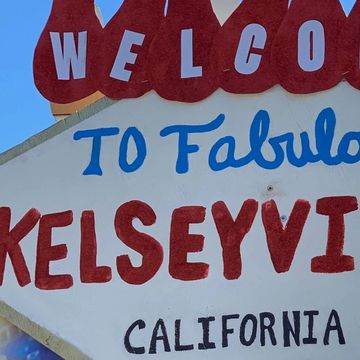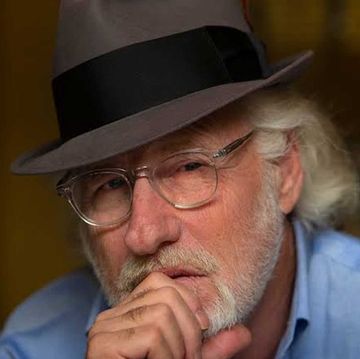The cynical view here in London is that the current incumbent of No. 10 Downing Street—Her Majesty’s Prime Minister, Alexander Boris de Pfeffel Johnson—is a man without principles, either personal or political. How well Johnson emerges from the coronavirus pandemic crisis will be what defines his political career, since he ascended to this, the highest elected office in our resurgently green (as a function of the pandemic) yet increasingly unpleasant land, only in July of last year. But it’s worth considering what Johnson’s vision for a Britain liberated from the shackles of the European Union looks like, since it runs so contrary to the usual one you Americans have of our scepter’d isle.
What I wish to suggest is that Johnson and his team have a separatist’s image of Britain as the California to the E.U.’s United States. Moreover, it’s not a vision much at variance with the reality; after all, there’s a big disjunction between the self-conception of any given nation—or state, for that matter—and its reality. Californians can be forgiven, I think, for picturing the United Kingdom as being just that: a happily organic society in which the queen (played by a revolving cast of fine Brit character actors, including Helen Mirren, Claire Foy, and Olivia Colman) rules over her happy extras, some in smocks and sucking on straws, others sporting pinstripe trousers and bowler hats. Some might say this is simply a pre–World War II Hollywood fantasia of Britishness—but the truth is, it’s one that plenty of my countrymen and -women subscribe to quite as much as any dream manufacturer.
Peter Morgan, the creator of Netflix’s series The Crown (and the writer of Stephen Frears’s movie The Queen), is but one of the Brit imagineers vitally involved in the nation’s Californification. His show’s portrayal of the royal family, the vicissitudes of whom are a synecdoche of the nation’s own rather diminished manifest destiny, looked before the coronavirus pandemic to have been amply fulfilled by what’s been dubbed here as Megxit—the departure from the royal family’s inner circle of Prince Harry and his wife, Meghan Markle. That the erstwhile princess was born in Los Angeles’s Canoga Park neighborhood, and made her name acting in a legal soap, only serves to underscore that, in the future Johnsonian Britain, the socially inferior partner in this morganatic marriage would in fact have been the queen’s grandson.
But at Easter, the queen took the very rare course of addressing the nation directly, and her ex cathedra pronouncement received rave reviews: this is the leadership we’ve been seeking! Percipient precisely because it’s aged: at 93, the queen was able to recall making her first public broadcast during WWII, 80 years ago—and it’s this canny reference to her own mediatization that neatly positions the Windsors in the same reality as The Crown, thereby burnishing both by mutual association.
But the correspondences between London and Los Angeles are far more than screen-deep. Both are cities that project powerful images yet are more at variance with their reality than those of either California or Great Britain. For L.A., it’s the silvery solecism that the city’s economy is dominated by the movie industry rather than aerospace and international shipping, whereas for London, it’s the touristic assumption that tradition—in the form of the landed gentry—continues to dominate, rather than anything as grubby and infra dig as mere trade. Of course, if people trouble to think where those typical English gents in their bowlers and pinstripe trousers are hurrying to, as they pass by quaint phone booths (that no longer house phones) and policemen wearing breast-shaped helmets, the answer comes back: the City—for this metonym, which bears the same relation to Britain’s financial services industry as “Hollywood” does to L.A.’s film industry, masks London’s real face, quite as effectively as the latter does L.A.’s.
Moreover, gone are the days when Britain’s finance industry could be viewed as some sort of bastion of prudence—some of the most suspect “black box”–style investment products have originated in the so-called Square Mile. Yes, another of those pesky metonyms—but arguably they’re all that remains to us of our traditions. This is another one for the City of London, reflecting the fact that it occupies the area once enclosed by Roman-era walls. Our former colonial overlords gifted us plenty of practical engineering, in the solid form of these ancient walls; however, this sort of financial engineering has more in common with that smoke-and-mirrors exercise, cinema. In truth, Britain has long since ceased to be a manufacturing or primary-extractive economy of any significance—with the exception, in common with California, of its defense and oil companies. No, what Britain does best is muck about with other people’s money—including the lucre rendered filthy by the activities of Russian oligarchs, and kleptocrats the world over, which many of our most august financial institutions are only too happy to launder. While what we export isn’t only Aston Martin sports cars, waxed-cotton Barbour jackets, and Daniel Craig’s pectoral muscles. On the contrary, almost half of British exports are rather more intangible: retail services and merchandising concepts; advertising and marketing; pop music, fashion design, and TV shows usually predicated on a Disneyfied image of our former mores and redundant customs.
THE COUNTERINVASION
Astute Americans have been experiencing the acidic reflux of the British counterinvasion for decades now. Spearheaded by the Beatles, playing their own Liverpudlian version of rock ’n’ roll, speedily followed by the Rolling Stones, the Kinks, et al., with their timely reworking of African American rhythm and blues. Yes, there’s no cultural appropriation like British cultural appropriation—and one of the things we’ve been keenest to do is to repackage your own rock and roll it straight back at you. But it isn’t just the States we’re keen on ripping off; perhaps one of the most curious of recent British appropriations is the sandwich-and-soup chain Pret a Manger. True, there have been Prets in the States for some time now, but that isn’t so strange; what’s really de trop is encountering a British-created, French-themed lunch counter in Paris! Only an English idiom will do to describe this flagrant flogging of coals to…Newcastle. And while we’re in Newcastle, it’s worth remembering that the waxed-cotton Barbour jacket (as worn by the regal Dame Helen in The Queen) was originally devised as foul-weather clothing for workers on the docks and at sea. There are obvious echoes here of the way denim—once synonymous with French peasant work wear, then latterly with the great western expansion of the United States—became in time the Californian countercultural uniform of the 1960s.
I realize it’s a bit of a stretch to locate Old Etonian Boris Johnson—whose own shtick is so studiedly and timelessly English posh—anywhere within the cultural purlieu of Haight-Ashbury; but in order to understand his regime, and its ambition to make Britain (quite possibly with the assistance of climate heating) into an offshore-Europe version of the Golden State, you need to consider the real power behind the throne: his special adviser, Dominic Cummings. Cummings, a quasi-libertarian maverick who attended Exeter College, Oxford University, was the strategist who won the referendum for those Brits desperate to leave the European Union. Cummings disdains the old Barbour-wearing Tories who’ve traditionally constituted Britain’s governing class, and he has been seen in the environs of Downing in training shoes and a sleeveless puffer jacket of the type sold by the Japanese chain store Uniqlo. Not only Uniqlo—Cummings also has the temerity to appear in the precincts of power sporting a Levi’s-branded hoodie.
And how Californian is that? Of course, the dishabille and informality of the upper echelons of Britain’s government have been increasing ever since Tony “call me Tony” Blair took office as prime minister—but it’s only with the looming exit from the E.U., and the inception of the Cummings-Johnson duopoly, that this tendency has become a nascent style. The philoprogenitive Johnson—it’s rumored he doesn’t even know how many children he’s sired—is currently affianced to Carrie Symonds, a woman 23 years his junior, and this, too, seems pretty West Coast rather than West End. Ms. Symonds has the same modish desire to dally with environmental politics as the CEOs of Silicon Valley tech companies and their partners, although with a £25,000 emerald on her finger, she looks more Kim Kardashian than Rachel Carson.
But why wouldn’t she? Her worse half is in the grand California tradition—think Ronald Reagan or Arnold Schwarzenegger—of entertainers turned politicians. As for Cummings, he’s never run for political office, while his spin doctor shtick seems straight from central casting. True, Johnson’s finest mediatized hours were spent cracking wise on a weekly television program that satirizes the news—but the important thing is, he’s ascended to the top of the greasy Brit political pole by virtue of his ability to reach the voters rather more conventional politicians can’t. In this, at a personal level, he embodies the weird contemporary interface between culture, the zeitgeist, and outrageous commercialization—and how Californian is that?
London, in common with Los Angeles, is a largely low-rise city—up until very recently, there were only two tall building clusters, one in the City, the other in the docklands reclamation zone known as Canary Wharf. Londoners, in common with Angelenos, are car drivers, despite the twisted convolvulus of the city’s unplanned streets. Indeed, Britons overall spent a colossal £48.4 billion on their wheels in 2018—and this despite the fact that the country’s only about half the size of California. Sometimes, flying back into Heathrow from LAX and contemplating the oceanic metropolis beneath me, I’ve been visited with a curious sense of déjà vu récemment: true, the smog is a different color, while the River Thames is considerably more curvaceous than the Los Angeles River; nevertheless, both cities seem detached from their own hinterlands, by cause of their size and significance.
And, of course, both cities are also part of larger entities—Britain, California—that stand proud of the still larger entities that in turn contain them. True, the example of Californian independence may not be one that Boris Johnson and his Uniqlo henchman wish to pursue: in 1846, you only managed under a month free from Mexico before being snaffled up by the States, but if John Bull really wishes to enhance his standing in the world, he may well be advised to go west, old man.
Will Self is a London-based novelist and journalist. Viking published his latest book, the memoir Will, in fall 2019.
Will Self is the author of 25 books, some of which have been translated into 25 languages. His latest is the memoir Will, published in the US by Grove. He is a prolific journalist – both in the UK, where he lives, and internationally. He also holds the Chair in Contemporary Thought at Brunel University.












